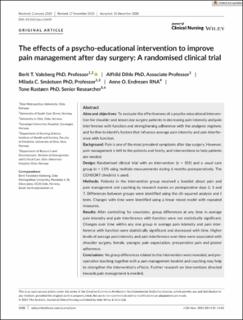The effects of a psycho-educational intervention to improve pain management after day surgery: A randomized clinical trial.
Peer reviewed, Journal article
Published version
Permanent lenke
https://hdl.handle.net/11250/2756841Utgivelsesdato
2021-01-12Metadata
Vis full innførselSamlinger
Originalversjon
Journal of Clinical Nursing. 2021, 30 (7-8), 1132–1143). https://doi.org/10.1111/jocn.15659Sammendrag
Aims and objectives:To evaluate the effectiveness of a psycho-educational intervention for shoulder and breast day surgery patients in decreasing pain intensity and pain interference with function and strengthening adherence with the analgesic regimen; and further to identify factors that influence average pain intensity and pain interference with function.
Background: Pain is one of the most prevalent symptoms after day surgery. However, pain management is left to the patients and family, and interventions to help patients are needed.
Design: Randomised clinical trial with an intervention (n = 101) and a usual care group (n = 119) using multiple measurements during 6 months postoperatively. The CONSORT checklist is used.
Methods: Patients in the intervention group received a booklet about pain and pain management and coaching by research nurses on postoperative days 2, 3 and 7. Differences between groups were identified using the chi-squared analysis and t tests. Changes with time were identified using a linear mixed model with repeated measures.
Results: After controlling for covariates, group differences at any time in average pain intensity and pain interference with function were not statistically significant. Changes over time within any one group in average pain intensity and pain interference with function were statistically significant and decreased with time. Higher levels of average pain intensity and pain interference over time were associated with shoulder surgery, female, younger, pain expectation, preoperative pain and poorer adherence.
Conclusions: No group differences related to the intervention were revealed, and preoperative teaching together with a pain management booklet and coaching may help to strengthen the intervention's effects. Further research on interventions directed towards pain management is needed.
Relevance to clinical practice: Day surgery patients’ postoperative pain and pain management is not satisfactorily handled. To encourage and educate patients to use the prescribed analgesics in the immediate postoperative days may be necessary to enhance pain management.
Clinical trial registration:
ClinicalTrials.gov (NCT01595035).

